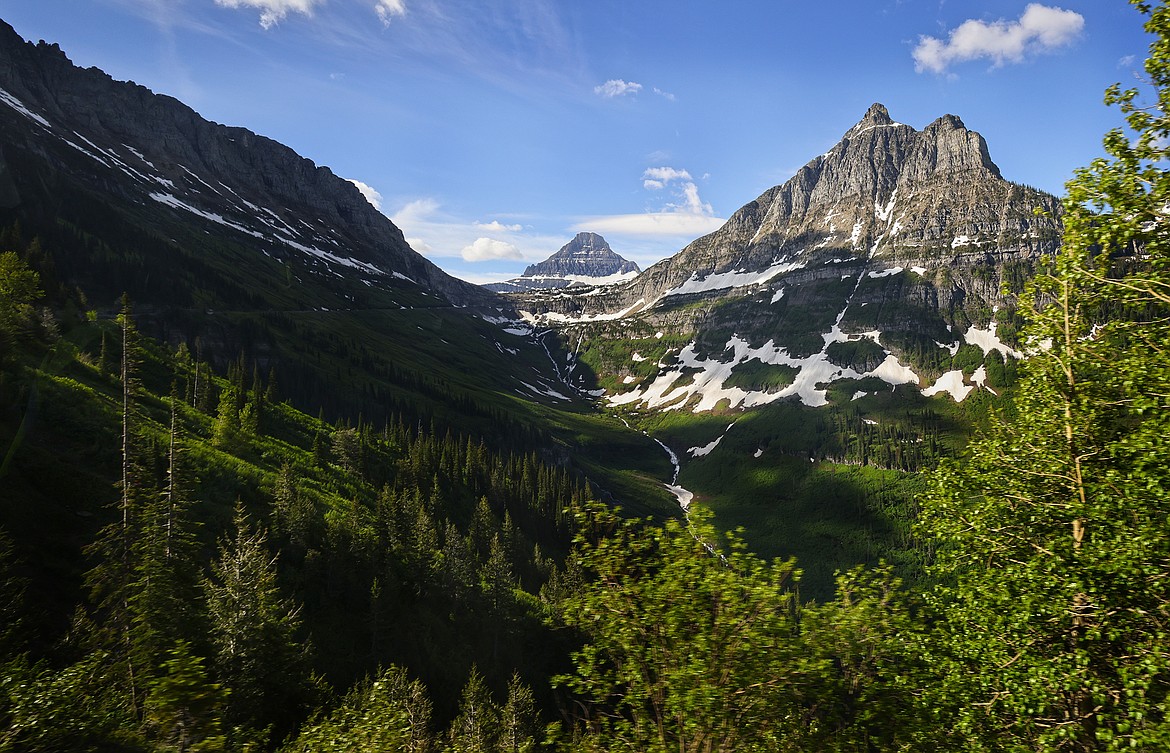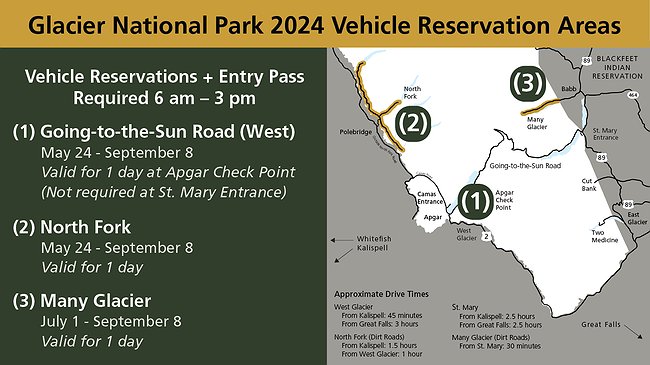Stakeholders weigh in on Glacier’s reservation system changes
Stakeholders and some previous critics of Glacier National Park’s vehicle reservation system are largely in favor of new changes coming next summer.
Rep. Ryan Zinke called the changes a “giant positive step forward” after petitioning for the removal of the reservation system since last year, saying it created unfair barriers for locals to visit the park.
Beginning next summer, no reservations will be required at the St. Mary entrance of the Going-to-the-Sun Road, or at the Two Medicine entrance. A filter station for the west entrance of Going-to-the-Sun Road will be moved past Apgar to allow access to the village and Lake McDonald.
“I'm glad to say that there's a lot of wins for locals on this, as there should be, for them to enjoy the park, particularly access on the east side,” Zinke said. “And now we'll ask for a transportation plan and work with the park to look at how to address a robust, working, experience-enriching transportation system in the park.”
Glacier has a hiker-biker shuttle system, however Zinke has advocated for increased public transportation options that provide a more enhanced experience for visitors. He said once a plan is in place, he will work with Congress to match the park’s resources to make it a reality.
Recently, the Republican representative wrote a measure into an appropriations bill for the Department of the Interior and Environmental Protection Agency to defund the park’s reservation system into obsolescence.
HR 4821 is on its way to the Senate, but there is little expectation that it will be signed into law. A memo from the White House that said President Joe Biden will veto the legislation if it comes before his desk, citing concerns with proposed funding cuts to federal agencies, particularly the EPA.
Zinke didn’t directly answer questions about whether he was still interested in defunding the reservation system, but said he would like to move ahead and see the park create a transportation plan.
“I greatly appreciate the superintendent's input on it and adjusting the course,” Zinke said. “Lessons learned — before you close public access, particularly in parks or national forests, we should have a discussion with local stakeholders and develop a plan that has everyone's interests at least being heard.”
Glacier National Park Conservancy Executive Director Doug Mitchell also applauded efforts by park administrators to hear what people had to say about the pilot vehicle reservation system. This fall, another public comment period was held for feedback on the vehicle reservation system, with two open houses in St. Mary and Columbia Falls that gave locals the chance to speak with park officials face-to-face.
“I'm delighted by the fact that the community, both the local community and the broader Glacier community nationally, spent a lot of time feeding back to the superintendent and the staff their feelings about the system. That's how things work best, is when we are in community with each other and sharing what worked and what didn't work,” Mitchell said.
He said it’s difficult to figure out a sweet spot that allows protection of the park while also opening it up for “the enjoyment of the people.”
“The major responsibility is to keep the national park intact. But of course, there's no sense in doing that if people can't find a way to access it,” he said. “So, it's a tough balancing act … And in this case, I really feel like we're starting to engage in a really good discussion as a community about how we meet that challenge together.”
Mitchell contends access management in the region is not new. He gave the example of skiing at Whitefish Mountain Resort, which was more easily accessible in previous decades.
“When you go up to Whitefish Mountain Resort, you don't automatically park up at the front like you used to when I was in my 20s. And they manage that, they’ll send you to a different parking lot and they created a shuttle system. So, I think we're in that stage here, where we're still in the learning phase,” Mitchell said.
GLACIER COUNTRY Tourism also weighed in on the changes. Director of Communications Lucy Guthrie Beighle said she trusts the process park officials went through to get feedback from visitors. She said in addition to the public comment period, park officials also looked at what feedback they were getting through their call center, which they funded in partnership with the Conservancy and other organizations.
Guthire Beighle said the tourism bureau will help spread the word about the upcoming changes to next year’s reservation system to incoming visitors, as they have done for the previous years. One move she believes will make a difference is the change from a Sun Road ticket being valid for three days to just one day. She said anecdotally, this could be because people weren’t coming back to the park for the remainder of those days, so a shorter time period will allow for more tickets to be made available.
“I have great trust in the process and group trust and the fact that they did their homework and they listened. And they looked at data, they're not just randomly making decisions. This is based on data and feedback,” Guthrie Beighle said.
Discover Kalispell Executive Director Diane Medler said she believes the park gets a little better at managing the pilot vehicle reservation system each year. Businesses they work with depend on having more time to plan for the upcoming summer, she said, so it’s helpful that the changes were announced sooner than in previous years.
Medler said the changes will give people more flexibility in visiting Glacier.
“That's what's important to our businesses,” Medler said. “Particularly, businesses that cater to those travelers that are coming from farther away. Because they're going to start planning their vacation here in January, if it's a summer vacation focused on Glacier Park. They’ll need to know when they can get a vehicle reservation, and then after they do that, they'll make their hotel reservation, book their rental car and everything else.”
Whitefish Chamber of Commerce Executive Director Kevin Gartland also said the tweaks to the reservation system make it move effective every year, adding that the most recent changes seem promising. However, he said it’s hard to educate the public when the system is constantly changing.
Medler agreed it’s challenging for businesses to keep up with the reservation system, as it’s changed in some way every year since it started being implemented in 2021.
“At Discover Kalispell, we put out a lot of messaging and resources that we share with our businesses to help educate visitors and residents. So that is really hard, to keep it all straight, to train your front of house staff to make sure they know the right resources and the right information. Because visitors are going to ask everyone from the server at the coffee shop to the front desk at a hotel, to any kind of business,” Medler said.
Glacier National Park Superintendent Dave Roemer said in a release about the upcoming changes that they will be testing reservations proactively in areas where congestion is likely, taking a “wait-and-see approach” at other locations, managing adaptively if needed.
A link to learn more about changes to the park’s pilot vehicle reservation system in 2024 can be found on the main page of Glacier National Park’s website, nps.gov/glac.
Reporter Taylor Inman can be reached at 406-758-4433 or by emailing tinman@dailyinterlake.com




